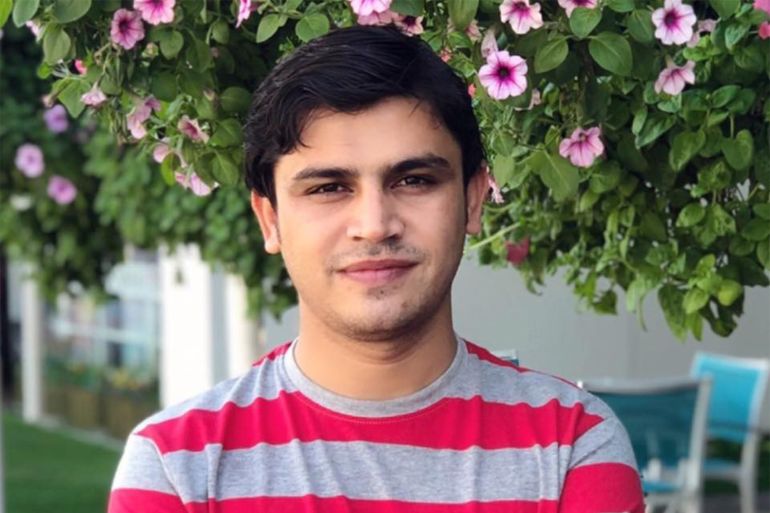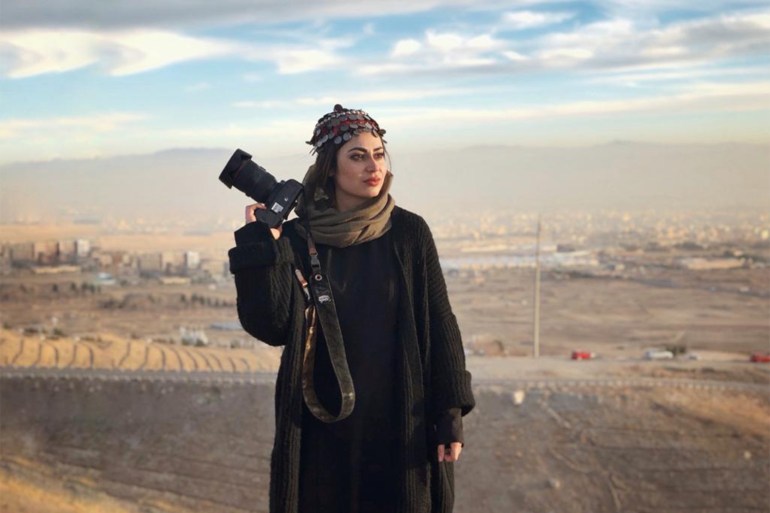Attack on Afghan reporter tests Taliban’s media freedom pledge
Ziar Khan Yaad from TOLO TV was attacked by apparent Taliban members in Kabul, raising question over promised media freedoms.

Kabul, Afghanistan – On Wednesday morning, Ziar Khan Yaad left the offices of TOLO TV, Afghanistan’s largest private broadcaster, and headed out to film a news report on the nation’s struggling economy in the wake of the Taliban takeover 12 days ago.
With his cameraman in tow, Yaad headed to the Haji Yaqub Mosque in the capital, Kabul, where dozens of daily-wage workers line up every day to procure construction, painting and other manual labouring jobs.
Keep reading
list of 4 itemsWhat the Taliban may be getting wrong about Islamic governance
Afghan journalists begin uncertain chapter under Taliban rule
What will Afghanistan look like under Taliban rule (again)?
Yaad had just started his on-camera interview when an armoured white Land Cruiser pulled up to the side of the road and men started storming towards them. Suddenly, the men, claiming to be Taliban, confiscated their phones, camera, microphones and other equipment, while others started beating the two media workers.
“We’re journalists,” they said, struggling to take out their media cards. Yaad says when the Taliban saw their media cards, they started to insult both men. “You ingrate journalists!”
As quickly as they arrived, the supposed Taliban members disappeared into Kabul’s streets.
Yaad’s case, which TOLO reported to the Taliban leadership, is one of the most high-profile cases of alleged Taliban intimidation and violence against journalists in Afghanistan. The Taliban has promised to investigate the matter, TOLO’s news director said.
What I feared was being caged, not being able to go outside and continue my work
Last week, German broadcaster Deutsche Welle said the Taliban killed and injured two family members of one of their Afghan journalists who is now based in Germany. Two journalists were also beaten, reportedly by the Taliban, while covering demonstrations in the eastern province of Nangarhar in the days leading to the August 19 independence day celebrations.
These early reports have prompted outrage from media freedom advocates.
“The Taliban need to live up to their promise of allowing independent media to operate freely. These wanton assaults on journalists by Taliban soldiers must stop immediately,” Steven Butler, the Committee to Protect Journalists Asia programme coordinator said.
Taliban promise on media freedom
At an August 17 press conference, Zabihullah Mujahid, the group’s spokesman, had issued an assurance to the media, saying, “Private media can continue to be free and independent, they can continue their activities … Impartiality of the media is very important. They can critique our work so that we can improve.”
As part of that assurance, on August 16 the Taliban had entered TOLO TV’s compound and promised to ensure the safety of an organisation it had deliberately targeted in a deadly January 2016 bombing. In subsequent days, they also appeared on the network, where one of their officials was interviewed by female presenter, Beheshta Arghand.
After the run-in, however, Yaad said he has a hard time believing those promises.
“We can’t practise journalism with any confidence anymore,” says the 28 year old, who has worked with TOLO for the last four years. Yaad returned to work the next day, but is not sure how much longer he and other journalists will be able to continue to work.

His unease is shared by many other Afghan media workers, especially women.
Last week, Shabnam Dawran, a female journalist working for the state broadcaster, RTA, said the Taliban posted a notice at the network’s entrance and would not allow her into the building, saying, “The system has changed.”
Again, Dawran’s experience does not align with what Mujahid has said in public. At the August 17 briefing, he said women, “are going to be working with us, shoulder to shoulder with us” and that under a Taliban leadership there won’t be “any discrimination against women”.
‘What I feared was being caged’
This contrast between the Taliban’s words and actions towards women and media workers is what led photojournalist Roya Heydari to flee the country four days ago. Heydari, who has documented her travels across 10 of the nation’s provinces for her 113,000 Instagram followers, says she feared being shackled by a Taliban system.
“Death only comes once, I’m not afraid of them killing me,” said Heydari, who is currently in France.
“What I feared was being caged, not being able to go outside and continue my work.”
The Taliban need to live up to their promise of allowing independent media to operate freely
Heydari says she is sadly not surprised by Yaad’s story, and fears that it could only get worse, especially for women if the group returns to its old ways. The Taliban’s first stint in power between 1996-2001 was marked by curbs on media freedoms while women were banned from education and work.
She points to Mujahid’s recent announcement that female government workers should stay at home until they can be assured that their fighters will not harm them.
To Heydari, such an unclear declaration is indicative of a slippery slope Afghan women find themselves on. “I couldn’t imagine them taking away my camera, telling me not to work. If I don’t have a camera, I don’t have a voice.”
When she fled Kabul, Heydari took only her camera with her.
Heydari says the Taliban can still turn things around, but the people need to see action, not just words, in order to start to building trust with the group they had long feared. She says if the Taliban can give her assurances that she can work, she will return to the nation and continue to tell the stories of her people.
“If they tell me to put on a hijab, I will. What’s a hijab? Just a piece of cloth. But I need to be sure that I can do my work and travel around. If I can do that, I’ll come back tomorrow,” she told Al Jazeera.